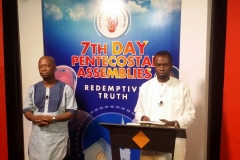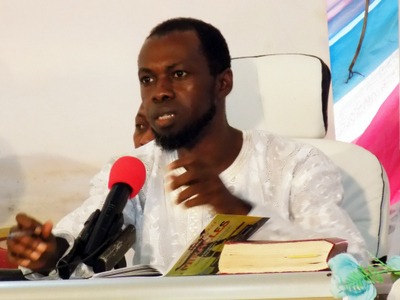“May God Make You like Ephraim and Manasseh”
By: Elder Enoch Ofori Jnr
(Gen. 48:20)
Ephraim and Manasseh are the names of the two sons of Joseph born to him in Egypt. As the patriarch Jacob pronounced his last blessings on them, he remarked: “In your name will Israel pronounce this blessing: ‘May God make you like Ephraim and Manasseh” (Gen. 48:20 NIV).
What is the significance of the names and what do they mean for us as believers? But first of all, why did Joseph name his sons Ephraim and Manasseh?
The names, in the tradition of Hebrew nomenclature, are self-explanatory:
Manasseh means “God has made me forget all my toil and all my father’s house”. Ephraim means “God has caused me to be fruitful in the land of my affliction” (Gen. 41:51-52). The miracle God of all possibility is able to make us fruitful and forgetful of our difficult past in the very place and situation of our affliction! As He bore the punishment that brought us peace, His invitation to cast all our worries on Him is for real (Isa. 35:5; 1 Pet. 5:7).
Ephraim and Manasseh are names that tell the story of Joseph—the tragedy that befell him and his miraculous rise to wealth and power in Egypt, the very land of his affliction!
As believers, our affliction is for a moment; God will never fail to remember us (Isa. 54:7-8). He has assured us in His word that our “light affliction is producing for us an eternal weight of glory far beyond all comparison” (2 Cor. 4:17 NAS).
Sometimes God deliberately allows evil men to oppress and trouble us for a while, but He ultimately brings us to a “wealthy place” (Ps. 66:12). As believers, we will come up against the storms of life (trials and temptations), but all will work out for our good (Rom. 8:28).
What is extremely important in the time of trial is to be careful not to offend God because of the apparent delay in His deliverance. This was the test the children of Israel, freshly delivered from Egyptian bondage, failed at the “waters of Massah and Meribah” (Ex. 17:1-17; Ps. 81:7). Instead of prayer, the people took up a compliant!
“Massah” means ‘trial, temptation, testing’ and “Meribah” means ‘contention’.
As we all know too well, a test is given in expectation of certain specific results from the examination candidate. How will he tackle the questions? How deep is his understanding of the subject? Will he give a yes or no answer? If a ‘yes’ answer, why? If a ‘no’ answer, why that too? It’s a test of knowledge, even of the candidate’s psychological preparedness and composure.
At ‘Meribah’ Israel failed to realize that the God Who brought them through the Red Sea could as easily provide them with water. So instead of trusting God, they began to mourn their possible death from thirst! The Israelites complained because they didn’t see the water they desperately needed. What we don’t see doesn’t indicate what God is unable or even unwilling to do. Indeed, what the eye has not seen or imagined ‘see-able’ is what God has prepared for those who love Him (1 Cor. 2:9).
What we don’t see (today) is the miracle that awaits us and for which we must trust God to do—even above all that we think or ask (Eph. 3:20)! He is able to supply all our needs (things we don’t have or see in our lives now) according to His riches in glory through Jesus Christ (Php. 4:19). If He can call things that don’t exist to appear by miracle (Rom. 4:17), is it reasonable to despair? The scripture says, “Whoever believes on Him will not be put to shame” (Rom. 10:11).
We should trust Him unto death: “For this God is our God for ever and ever: He will be our guide even unto death” (Ps. 48:14). His Word is True! Halleluiah!



